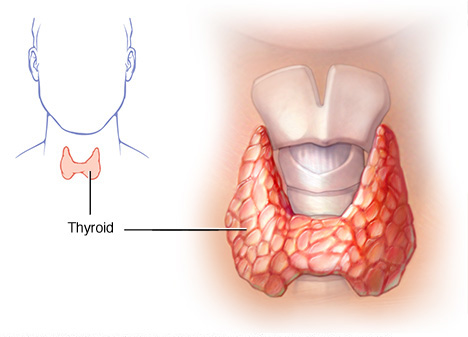


Thyroid disorders are conditions that affect the thyroid gland, a butterfly-shaped gland in the front of the neck. The thyroid has important roles to regulate numerous metabolic processes throughout the body. Different types of thyroid disorders affect either its structure or function.
The thyroid gland is located below the Adam's apple wrapped around the trachea (windpipe). A thin area of tissue in the gland's middle, known as the isthmus, joins the two thyroid lobes on each side. The thyroid uses iodine to produce vital hormones. Thyroxine, also known as T4, is the primary hormone produced by the gland. After delivery via the bloodstream to the body's tissues, a small portion of the T4 released from the gland is converted to triiodothyronine (T3), which is the most active hormone.
Thyroid disease is a common problem that can cause symptoms because of over-or under-function of the thyroid gland. The thyroid gland is an essential organ for producing thyroid hormones, which maintain body metabolism. The thyroid gland is located in the front of the neck below the Adam's apple. Thyroid disease can also sometimes lead to enlargement of the thyroid gland in the neck, which can cause symptoms that are directly related to the increase in size of the organ (such as difficulty swallowing and discomfort in front of the neck).
Just as the types of thyroid conditions can vary, so can the symptoms of thyroid problems. Here, we have listed ten common symptoms of thyroid disease:
• Nervousness and tremor: These symptoms, along with agitation, can signal an overfunction of the thyroid gland (hyperthyroidism).
• Mental fogginess and poor concentration: Mental functioning can be affected in both hyperthyroidism (elevated levels of thyroid hormone) and hypothyroidism (too low levels of thyroid hormones). While sluggishness and depressed mood are often associated with hypothyroidism, hyperthyroidism can also lead to a reduced capacity for concentration.
• Menstrual changes: Hypothyroidism is sometimes associated with excessive or prolonged menstrual bleeding, while hyperthyroidism can be characterized by scanty or reduced menstrual flow.
• Feeling bloated: Fluid retention is often a sign of an underactive thyroid gland.
• Racing heartbeat: An increased heart rate (tachycardia) and palpitations can be symptoms of hyperthyroidism.
• Aches and pains: Muscle aches and pain can accompany different types of thyroid problems.
• Weight gain: A modest amount of weight gain often accompanies conditions in which thyroid gland activity is lower than normal.
• High cholesterol levels: An increase in blood cholesterol levels can occur in individuals with hypothyroidism.
• Heat intolerance: People with an overactive thyroid gland often complain of intolerance to higher temperatures.
• Feeling cold: Conversely, those with an underfunctioning thyroid may feel constantly cold.